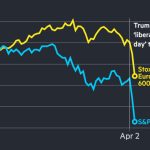Unlock the Editor’s Digest for free
Roula Khalaf, Editor of the FT, selects her favourite stories in this weekly newsletter.
The Bank of Japan has raised interest rates for the first time since 2007, becoming the world’s last central bank to end negative rates as the country puts decades of deflation behind it.
Following a 7-2 majority vote, the BoJ said it would guide the overnight interest rate to remain in a range of around 0 to 0.1 per cent. The central bank will continue with roughly the current amount of Japanese government bond purchases.
The widely expected move on Tuesday came after workers at some of Japan’s largest companies secured their biggest pay rise since 1991, giving BoJ governor Kazuo Ueda enough confidence that mild inflation will continue.
The end to one of the most contentious economic experiments of recent times comes as signs emerge of broader change in the Japanese economy.
In February the Nikkei 225 stock index finally surpassed the level reached 34 years ago, while more companies are passing on the costs of inflation to consumers and labour shortages are contributing to higher wages.
Still, the BoJ’s pledge to keep buying Japanese government bonds on Tuesday underscores the continuing weakness in the economy, as household consumption has remained sluggish.
Inflation, which was sparked by a rise in imported energy and food prices, is well beyond its peak. Core inflation, excluding volatile fresh food prices, slowed in January for the third straight month.
Despite the return to positive interest rates, economists said rates were likely to stay very low for the foreseeable future, and BoJ officials do not see the first rise as a signal that more will quickly follow.
Read the full article here












